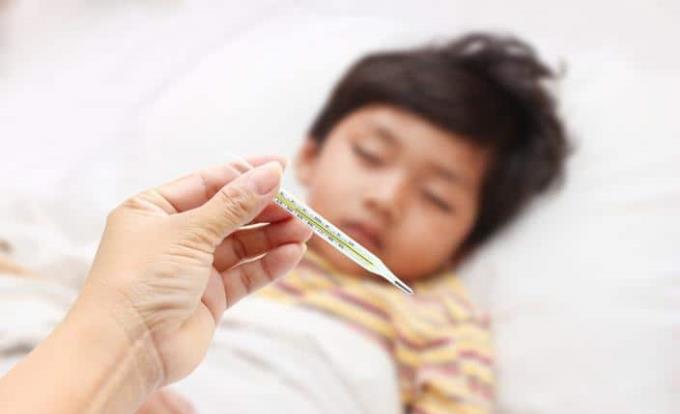Complete template of the whole vascular system in the body

After a series of medical measures they obtained a complete human vascular system profile.
Recognizing the correct signs of the flu, parents will have an effective coping strategy to help their baby recover quickly.
20,000 is the number of children under 5 years old hospitalized each year for the flu. The number of deaths from this disease is not high, but it can be life-threatening. Flu can be treated and prevented if you get to know them well.
Influenza is an acute respiratory viral illness caused by viruses. These viruses are divided into 3 types: influenza A, B and C. This division depends on how spread they are. Types of influenza are further divided into smaller units such as H1N1, H5N1… In general, these viruses often affect the lungs and respiratory system. Some common types of influenza in humans include:
H1N1 (swine flu)
H2N2
H3N2
H5N1 (avian flu).
Influenza is a contagious disease and can develop into a pandemic, depending on local sanitary conditions and climatic issues.
Flu viruses can affect people at any time of the year. However, the most susceptible time is usually in October and lasts until May. Disease outbreaks usually occur between December and March because this is the time when young children are most vulnerable.

Everyone is at risk of getting the flu, but who are most at risk are:
Children under 5 years old, especially children under 2 years old
Pregnant and postpartum women
Elderly people living in nursing homes or long-term health care facilities
People 65 years of age and older.
Children with the following conditions are also very susceptible to the flu:
Asthma
Blood disorders
Kidney disorders
Liver disorder
Neurological problems
Fat
Chronic lung disease
Weakened immune system
Endocrine disorders
Congenital heart disease
Metabolic disorder
People under the age of 19 who have been treated with aspirin for long periods of time are also very susceptible to the flu.
Children are more likely to get the flu than adults because their bodies are still developing. Flu can cause hospitalization and death. The best way to combat it is to treat it early. To do this, you need to know the cause of the flu.
Influenza viruses spread from person to person through air, water, food, and daily contact. So, your child will get the flu when:
Contact someone with the flu when they sneeze or cough
Contact or share items with children who are sick with the flu. Flu viruses exist in many places such as pencils, notebooks ...
Drink from the same water bottle or eat with someone with the flu.
Once infected, symptoms of the flu will begin to manifest and last for about 7 days. Influenza viruses usually spread to others during the first 24 hours after becoming infected. This makes preventing the flu difficult.

It is easy to confuse the symptoms of the flu with the symptoms of a cold . Although they are quite similar, there are a few differences that you should keep in mind.
Colds and flu are two completely different illnesses caused by different viruses. A cold has no cure, its symptoms can only be prevented or controlled.
Influenza is caused by a virus belonging to the flu family and there is a way to treat it. The signs of the flu include headache, along with common cold symptoms such as cough, sore throat, muscle aches ... Flu can also cause vomiting, diarrhea, and high fever.
More serious symptoms are wheezing and usually start 2 days after the baby is sick. Some common flu symptoms are:
Fever
Chills
Headache
Muscle aches or body aches
Cough
Fatigue and weakness
Runny or stuffy nose
Sore throat
Dizziness
Loss of appetite, nausea or vomiting
Ear hurt
Diarrhea.
These symptoms are quite common in patients with influenza A or influenza B. Children with influenza C often have the following symptoms:
Weep
Uncomfortable
Reddened eyes, nose, throat and skin
Influenza C is often very rare and causes little disease.
Flu is a dangerous and life-threatening illness. This is an infectious disease that spreads very quickly. Therefore, you should take your baby to the doctor as soon as possible.
You should take your baby to hospital immediately if he has a fever and is accompanied by the following symptoms:
Cannot drink fluids
Drowsiness and pallor
Vomiting
Shortness of breath
Severe headache
In addition, your child must go to the emergency room when:
The baby's lips turn green
Children cannot walk
The child was stunned, dazed
The child's neck is stiff
Children have a stroke.
The doctor will prescribe a special treatment for the child based on age, medical history, physical condition and medical conditions. Treatment may include the following:
Fever-reducing medications like paracetamol and pain relievers like ibuprofen are used for body aches and pains. Do not give aspirin to your child without consulting a doctor.
More rest will help your baby recover faster.
Cough medicine prescribed by the doctor. Do not use over-the-counter medicines to treat coughs and sore throats.
The doctor will prescribe a few antiviral drugs for the child to shorten the time they are sick. These drugs are not intended to cure illnesses.
Your doctor will advise you to give your child plenty of fluids.
The flu usually lasts about 5 days or less. After recovery, the child is still weak and may cough. With proper treatment and care, symptoms of the flu should go away within 2 weeks.
Sometimes, fatigue can last 4 - 5 weeks. If not treated properly, it can worsen and lead to pneumonia or other serious respiratory illnesses.
Some of the following measures can help support flu treatment at home. However, these measures are not able to completely eliminate the virus that causes the disease.
Children may not drink or drink water because of a sore throat or nausea. This can lead to dehydration and make recovery difficult. Therefore, pay attention to give children plenty of water every day.
Hot soups or warm lemon juice are great remedies for soothing the throat. Chicken soup is a dish that helps treat the flu quite effectively. You can give children 1-2 times a day to strengthen their resistance against the virus. Warm water also helps soothe the nose and throat, alleviating discomfort.
The child's immune system is using all its energy to fight the flu virus. That is why people with the flu often get tired. Let your child rest as much as possible to spend all his energy fighting the virus.
Use a humidifier in your child's room to help ease a stuffy nose. When using, change the water every day to prevent mold growth. A hot bath can also help your child feel more comfortable.
If your child complains of headaches, apply a warm washcloth to the child's head to help relieve the headache.
The influenza virus can lead to a blockage in the lungs, making it difficult for a child to breathe. Gargle helps remove phlegm and clears airways. In addition, it also helps relieve sore throats.
Add 1 teaspoon of salt to 1 cup of warm water. Let your child suckle for 5 minutes each time, 4 times / day.
You can also use apple cider vinegar to rinse your baby's mouth every day.
You can also try giving your child a mouthwash with herbal teas or with honey and water ( do not give honey to children under 1 year old ).
Sucking on candies can also be helpful for children with the flu. Let your child suck on ginger or lemon candies to relieve a sore throat.
A steam bath can help reduce congestion. You can give your child a steam bath by boiling a pot of hot water and closing all doors. The steam will help mucus in the nose to easily drain. When steaming, you can add a little mint leaves or rosemary to the pot of water. Cover for 5 minutes to allow the herbs to penetrate.
Nasal washing is a way of using salt water to clear mucus in the child's nose, preventing sinus infections. Pour a little salt water into your nostrils to let it drain, then continue with the other hole. Use this method with older children, not babies or toddlers.
Eating and drinking also plays an important role in the treatment of flu. In addition to drinking plenty of fluids, eating nutritious foods will also help your child fight off the virus. You should give your child foods rich in vitamin C such as oranges, green vegetables, grapefruit ... to strengthen resistance and clear phlegm.
Honey is also a food with natural antibacterial properties, helping to relieve sore throats and coughs associated with the flu. You can give your child a teaspoon of honey mixed with lemon and warm water twice a day. Or you can give your child about 10g of honey before bed to limit coughing at night.
Ginger is also very helpful in treating sore throats and coughs. Boil a few pieces of ginger in water and let your child drink 2-3 times / day.
Garlic contains the compound allicin, which has antibacterial properties and helps fight influenza viruses. If the child cannot chew raw garlic, you should chop the garlic into the child's soup.
You can use the roots of the echinacea plant to treat flu in children. This plant can increase resistance and fight the flu.
Yogurt contains probiotics which also help boost the immune system and aid digestion. A healthy immune system can fight the flu virus better.
Vegetables are also rich in vitamins and minerals, which help provide energy to the body to fight viruses. You should give your child plenty of vegetables every day.
Oranges are high in vitamin C. One glass of orange juice a day helps your child fight off the flu.
Bananas are rich in potassium, which helps to reduce nausea caused by the flu.
If you do not recognize the signs of the flu early, it can develop into chronic illnesses such as asthma, pneumonia, heart failure, diabetes ... Give your child a prescription medication. If taken correctly, the baby will recover after 3-5 days. If the child is older (about 8-12 years old), the disease will last about 1-2 weeks.
There is no influenza vaccine for infants (0 - 6 months) but babies are at high risk of infection.
You can prevent influenza in the following ways:
Get the full flu shot for children 6 months through 5 years of age. Before you get injected, consult your doctor.
Practice personal hygiene habits for children to avoid the spread of the virus. Encourage your child to wash their hands often, especially before eating.
Do not let children share water bottles or food containers with others even if they do not get the flu.
Cover your cough or sneeze.
Vaccination is very important to prevent the flu virus from spreading to children from infected people. Vaccines are also essential to prevent super infections from people with chronic lung disease.
Flu vaccines are usually safe. Serious side effects associated with the flu vaccine are very rare. However, children may experience some of the following side effects:
Muscle pain
Low-grade fever
Pain at the injection site
Allergic reactions (this is rare).
Flu viruses change once a year. Therefore, if the vaccine was given the year before, this year is not effective. A new vaccine will be produced each year to deal with possible mutations. So it's very important to get a regular flu shot every year.
Influenza A virus can cause epidemics if you do not take good care of your child. If you or your baby has been infected with the virus, there are steps you can take to prevent the flu from spreading to others:
Vaccinate other family members who are not infected.
Teach your child to cover his / her mouth when coughing or sneezing.
Encourage your baby to wash their hands after coughing or sneezing.
Wash your hands before and after touching anyone with a respiratory infection such as asthma.
Used paper towels must be placed in the trash and not left in the house.
Limit your contact with other people. If your child is going to school, take a break to avoid infecting you.
Avoid sharing toys with other children.
The flu is not trivial. You cannot always protect your child from viruses, but you can help your child get better quickly with the above methods.
After a series of medical measures they obtained a complete human vascular system profile.
Watermelon is one of the fruits that many people love, not only cheap but also delicious, nutritious and refreshing in the summer. To get delicious watermelon pieces, show off your housewives, your artistic talents to cut beautiful pieces of watermelon.
The dog is an animal that is close to humans, it is also the first animal that humans were purebred, about 15,000 years ago at the end of the Ice Age.
aFamilyToday Health - The digestive system and body in each baby is different. Parents need to recognize notes to deal with when babies have a food allergy!
Babies need many factors for perfect development. aFamilyToday Health shares with parents things to keep in mind when babies are 8 weeks old so that parents can take care of their babies the best!
Babies need many factors for perfect development. aFamilyToday Health shares with parents things to keep in mind when babies are 18 weeks so that parents can take care of their babies the best!
Babies need many factors for perfect development. aFamilyToday Health shares with parents things to keep in mind when babies are 28 weeks old so that parents can take care of their babies the best!
Babies need many factors for perfect development. aFamilyToday Health shares with parents things to keep in mind when babies are 32 weeks old so that parents can take care of their babies the best!
aFamilyToday Health provides basic knowledge about 3 popular formula milk types, helping you to choose the right milk for your baby's needs.
In addition to giving babies the opportunity to enjoy valuable nutrition, what other interesting benefits can breastfeeding mothers enjoy?








